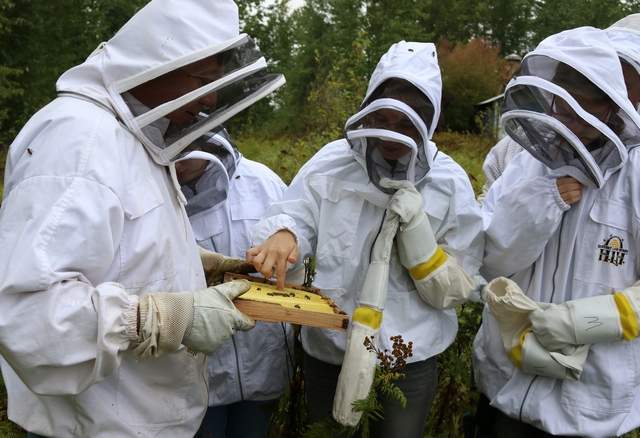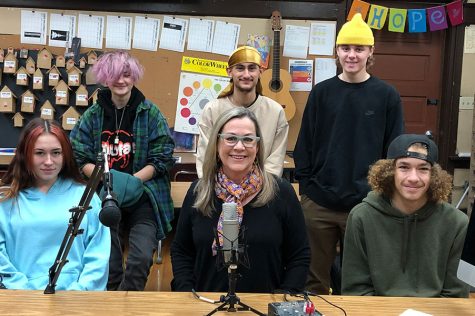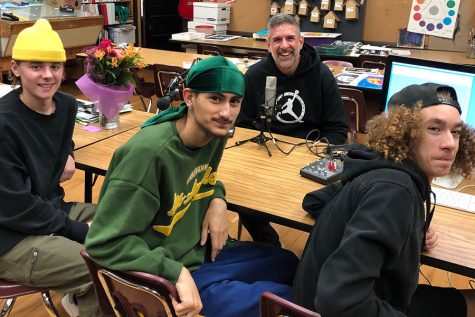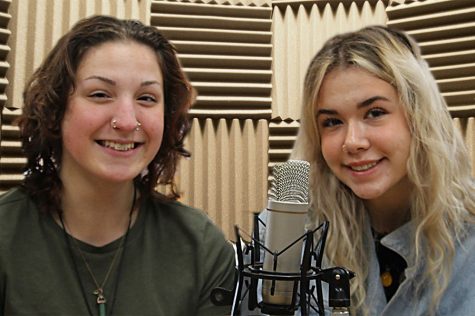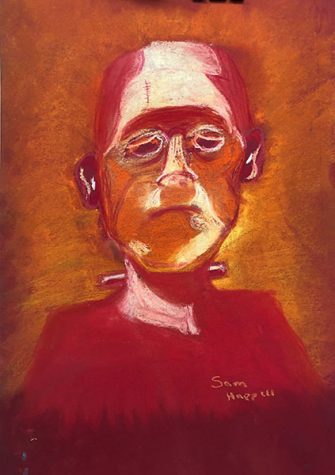LPOHS Gets hands-on with Bees
September 21, 2019
This story was published in the Bonner County Daily Bee, September 21, 2019. Written by Mary Malone. Mary Malone can be reached by email at [email protected] and follow her on Twitter @MaryDailyBee.
SANDPOINT — Each honey bee has a job to do, whether it be the queen, who fertilizes the hive, the guard bee that does just what its title indicates, or the hard-working worker bee who makes the honey among a number of other important tasks.
Students at Lake Pend Oreille High School are learning about the different aspects of beekeeping this year, including the different jobs of the bees. However, they are not learning it from a book. They are doing hands-on hive work this year with their teacher, Randy Wilhelm, who recently got into beekeeping as a hobby.
“I wanted to do it this spring, so I bought all this equipment and had it stacked outside my shop last year,” Wilhelm said. “I came home from school one day and a swarm had moved into those boxes. It was a huge swarm, so I spent all summer on YouTube learning about bees. So I thought it would be cool to do with the kids because I was really fascinated by it, and they have gotten into it.”
Wilhelm received a grant from the Panhandle Alliance for Education in May, which purchased seven protective bee suits for the students. He was able to purchase additional suits through plant sales at the school greenhouse as well. All of the equipment and the bees are Wilhelm’s. In addition, Ned Brandenberger from Sandpoint Property Management is letting the group use some property of of Boyer Avenue, just a couple blocks from the school, to house the hives.
“We want to help where we can,” Brandenberger said. “There is not anything else happening on this particular part of the property and it is close to the alternative high school, so I think it is great that we are able to allow this use out there … We are glad we are able to contribute.”
Wilhelm and the students go out to the hives once a week. Their last trip on Thursday was a tasty one, too, as everyone got to try some of the honey. The tasting resulting in murmurs of, “Mmm, that is some good honey,” and “That is some sweet honey.”
“It’s like eating a strawberry out of the garden,” Wilhelm said in comparison after asking the teens if it tasted different than what they typically get from a store.
Using a smoker to calm the bees, Wilhelm pulled the frames, each one covered with a mass of bees and honey, from each hive one by one. The guard bees swarmed the group as he did so, but the protective suits did their job. While a couple of the students stayed back, most of the students, including Caitlin Yarber who said she “loves” the bees, stayed close, helping out when needed.
They fed the bees some sugar water — two parts sugar to one part water — and located one of the queens, which was marked with a green spot for easier identification. Before departing, Wilhelm treated them for varroa mites, which can be deadly to the bees if left untreated, causing colonies to collapse. Not only do they suck the blood of adult bees, they get inside eggs and feed on the bee that is forming, Wilhelm said. Wilhelm is treating the hives once a week for four weeks to keep the bees strong as winter approaches.
Because the hives are young, the honey will not be collected this year, but Wilhelm hopes to harvest it with the students next year.
“Call me up next year and I will be here,” Yarber, who is a senior at LPO this year, told Wilhelm.
In one interesting turn, a hive that is just a few months old has been queenless since July, he said, adding that he tried to requeen it on July 7, but the youngsters rejected her. Another hive is lacking some resources, which could be deadly in the winter months. That will be another lesson for the students, however, as they may have to combine two of the hives at a later date. To do that, Wilhelm said he will spray a newspaper with sugar water and lay it on top of one hive, stacking the other hive on top of that.
“They would get used to each other, and then the queens would fight to the death,” Wilhelm said.
While the summer bees, particularly the worker bees, have a short life span of as little as six to seven weeks, the winter bees will live for about six months, Wilhelm said. The bees that live in the hive through the winter are called fat bees, he said, and their job is to keep the queen warm through the winter. They will die in the spring.
Yarber was not the only student who was excited by the bees, as some of the seven teens who helped out on Thursday said they are thinking about making it a hobby as well. Jeremiah Harpe, for example, said he wants to learn how to raise queens some day, as raising bees for honey is not the only option. The experience has also helped alleviate fears for some of the students.
“I used to be terrified of all bees, but after this I’m not,” said LPO student Abbey Greer.
Wilhelm said he hopes to continue and expand on the project in the future, and any community members who would like to see the bees are welcome to contact him.
“We would love to have them contact us and they can come with us when we go over there,” he said. “We will suit them up of course.”
Anyone interested can contact Wilhelm by email at [email protected] or call the school at 208-263-6121.



